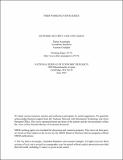Network security and contagion
Author(s)
Acemoglu, K. Daron; Malekian, Azarakhsh; Koksal, Asuman E.
DownloadAcemoglu_Network security.pdf (1.746Mb)
OPEN_ACCESS_POLICY
Open Access Policy
Creative Commons Attribution-Noncommercial-Share Alike
Terms of use
Metadata
Show full item recordAbstract
We develop a theoretical model of security investments in a network of interconnected agents. Network connections introduce the possibility of cascading failures due to an exogenous or endogenous attack depending on the profile of security investments by the agents. We provide a tractable decomposition of individual payoffs into an own effect and an externality, which also enables us to characterize individual investment incentives recursively (by considering the network with one agent removed at a time). Using this decomposition, we provide characterization of equilibrium and socially optimal investment levels as a function of the structure of the network, highlighting the role of a new set of network centrality measures in shaping the levels of equilibrium and optimal investments. When the attack location is endogenized (by assuming that the attacker chooses a probability distribution over the location of the attack in order to maximize damage), similar forces still operate, but now because greater investment by an agent shifts the attack to other parts of the network, the equilibrium may involve too much investment relative to the social optimum.
Date issued
2016-11Department
Massachusetts Institute of Technology. Department of Economics; Massachusetts Institute of Technology. Department of Electrical Engineering and Computer Science; Massachusetts Institute of Technology. Laboratory for Information and Decision SystemsJournal
Journal of Economic Theory
Publisher
Elsevier BV
Citation
Acemoglu, Daron, Azarakhsh Malekian, and Asu Ozdaglar. “Network Security and Contagion.” Journal of Economic Theory 166 (November 2016): 536–585.
Version: Original manuscript
ISSN
00220531